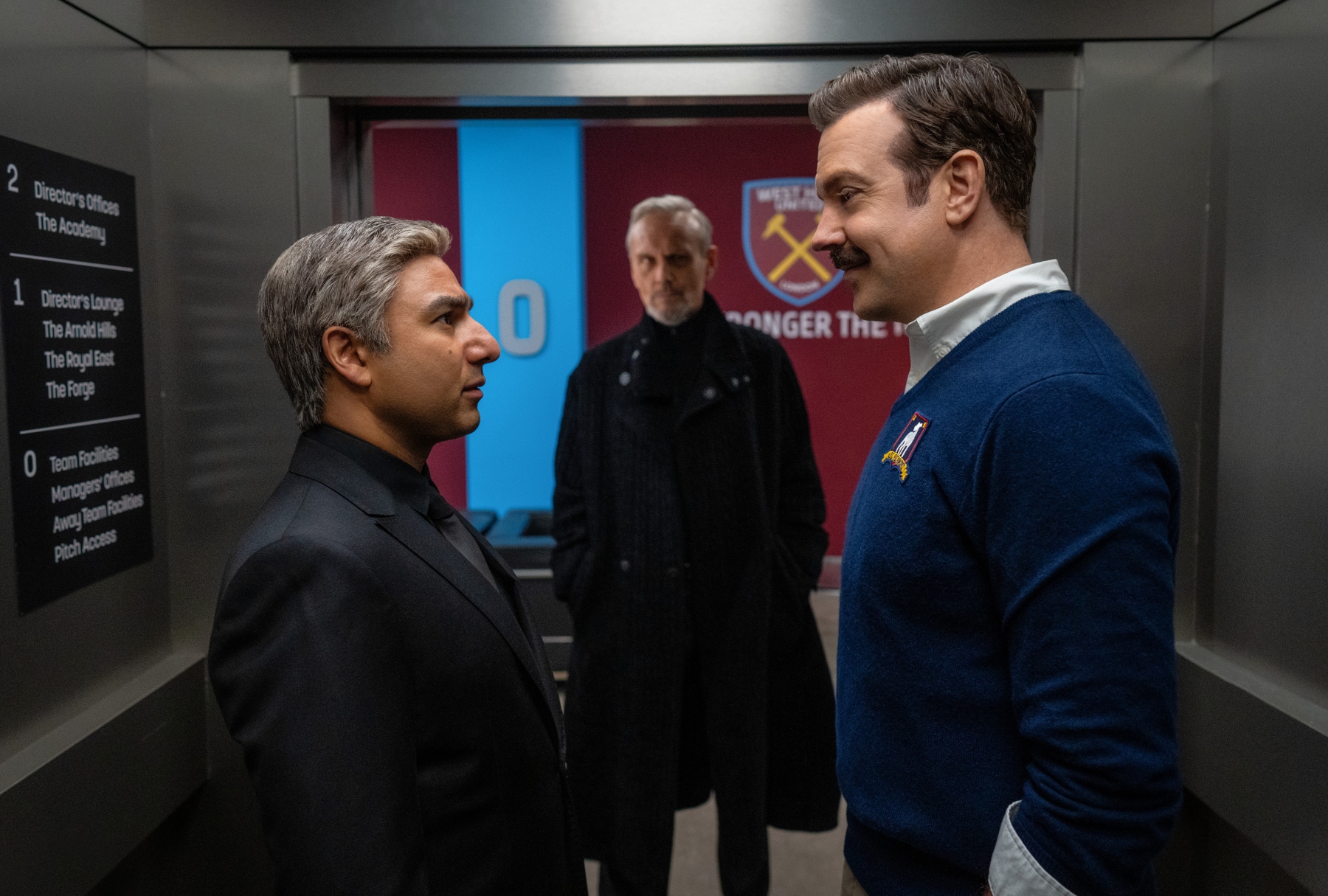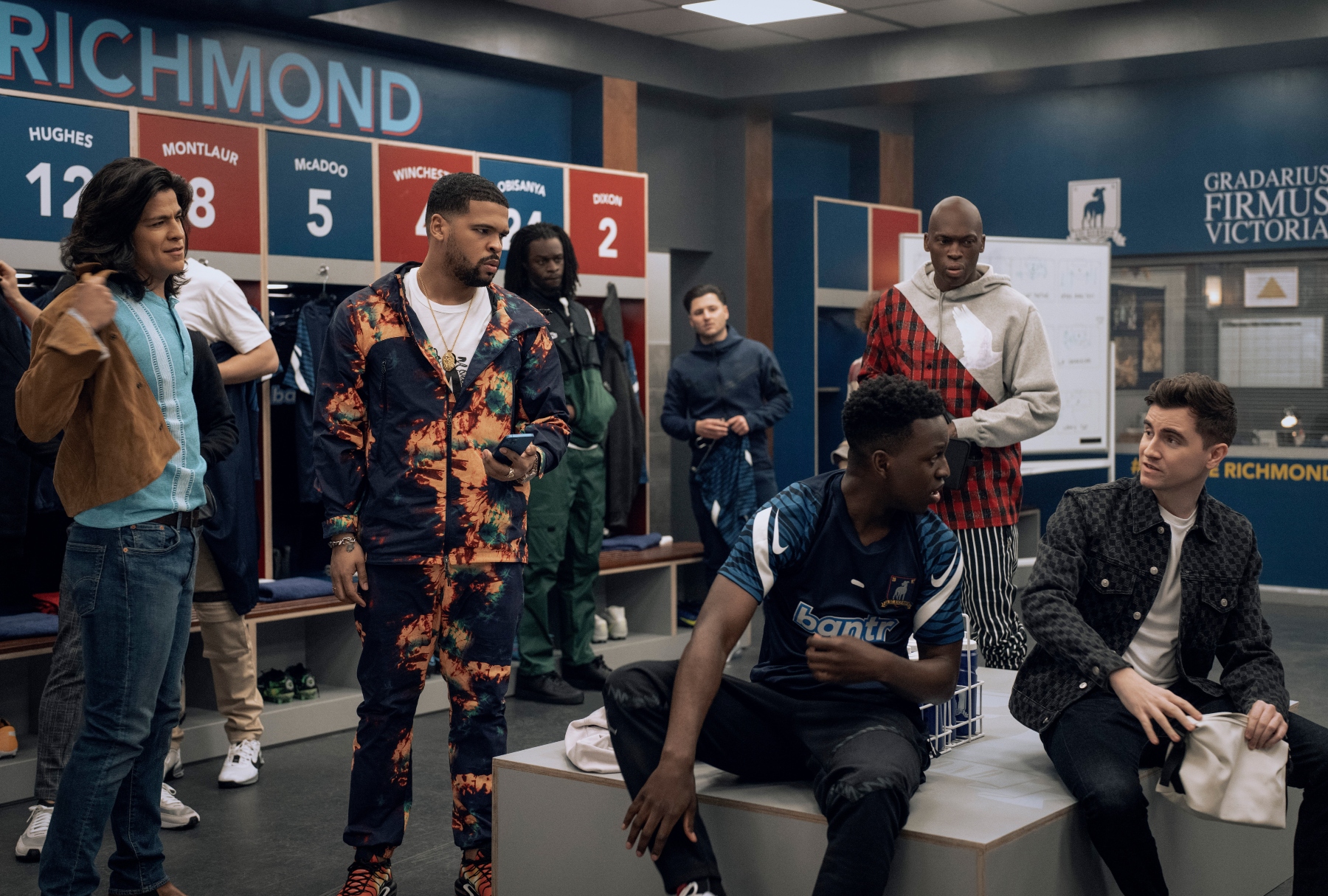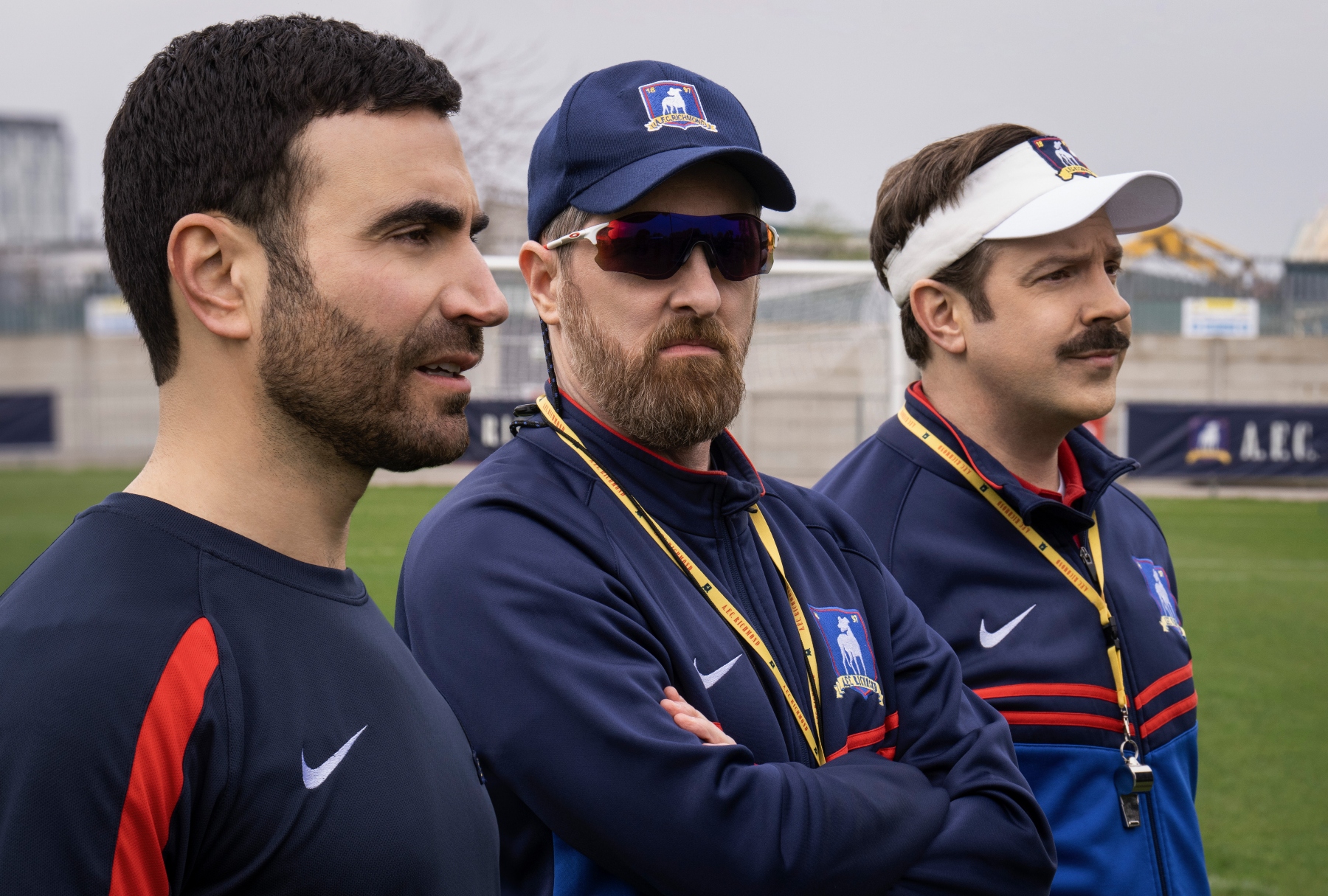“Ted Lasso” is as self-aware of a comedy as its hero struggles to be. At its best its ruminative efforts warmly bathe us in optimism and good feelings. Wherever and whenever it stumbles, disappointed fans react as if they’d been slammed in the face by a soccer ball. Either way, those who watch the show still care enough about Jason Sudeikis’ folksy coach to feel its two-year absence.
That may not necessarily make the heart grow fonder, but a little distance might incline us to be more open to what Sudeikis and his collaborators Brendan Hunt, Bill Lawrence, and Joe Kelly attempt in its third and possibly final season. Sudeikis has only hinted at this by telling several reporters that these episodes complete the story precisely as he envisioned, but neither he nor anyone else involved with the show has confirmed that this is it.
What it may acknowledge is that his character’s unpretentious charm and the cheerful familiarity of The Ted Lasso Way have limitations. The second season confirmed that when AFC Richmond’s irrepressible harmony during the first half of the season left viewers wondering where the tension was, clouding our vision to the point that the 11th-hour heel-turn of the team’s “Wonder Kid” Nate Shelley (Nick Mohammed) evoked the feeling of being unearned.
A balanced third season of any show should answer or resolve whatever concerns were left by such a cliffhanger, and to a certain degree “Ted Lasso” achieves this by circling back to the start. Sometimes a show does this to remind an audience of why we fell in love with it in the first place. In other cases, this story included, the purpose is to investigate how these people we’ve gotten to know would answer the story’s initial questions now, and the ways that experience may have changed their outlook.
Since the “Ted Lasso” appeal is existential, either overtly or low-key, it makes sense for the Greyhounds to sit with their feelings and figure themselves out by asking who they are, what they want, and whether they’re meant to do what they’re doing.
To this extent the show’s third verse is very much like the first. Whether those queries filter through emotionally damaged but recovering people like Ted and Rebecca (Hannah Waddingham) or through the tension between rising power player Keeley Jones (Juno Temple) and terse football legend Roy Kent (Brett Goldstein), the show’s latest episodes gamely revisit old questions about empathy, emotional honesty and the means by which we fall short of our best intentions. Three seasons in, though, everyone is more open with each other and understanding of Ted, who can now admit he’s a mess without collapsing.
Since the “Ted Lasso” appeal is existential it makes sense for the Greyhounds to sit with their feelings and figure themselves out.
Picking up a few months after the events that closed Season 2, the end of Ted’s extended visit with his son leaves him wondering what he’s still doing in England. He came to the U.K. seeking distance from a failing marriage, a new challenge and – like that goldenrod locker room sign says – something to believe in.
A couple of seasons later, he still doesn’t know very much about the sport he’s coaching and falls back on insistent kindness to hide his panic attacks. Now, he’s dealing with the true professional danger resulting from Nate’s defection to rival team West Ham United, owned by Rebecca’s vindictive ex-husband Rupert (Anthony Head). Rebecca fell for Ted’s heartfelt optimism when she and the Greyhounds were at their emotional low.
This season, as she tells Ted time and again, she’s done being content with congeniality and team spirit. She wants to win.
 Nick Mohammed, Anthony Head and Jason Sudeikis in “Ted Lasso” (Apple TV+)
Nick Mohammed, Anthony Head and Jason Sudeikis in “Ted Lasso” (Apple TV+)
But so does Nate, and the difference between how he and Rupert define victory versus how Ted and Rebecca see it has to do with the public’s perception of power. Every season of “Ted Lasso” lands with a specific emotional calling card, or several. This one extend the second season’s wellness threads with Ted continuing his counseling with Dr. Sharon Fieldstone (Sarah Niles) via video sessions and resisting the Midwestern urge to stifle his true feelings to make everyone else comfortable.
That concept takes on different shapes in other corners of the pitch: Keeley is coming to terms with what it means to be the boss at her new public relations firm KJPR, what it means for a woman to wield power and how the two concepts don’t always match. Rebecca endeavors to find the right blend between supporting Ted’s way of defeating mean-spiritedness with kindness and her desire for the team she owns to be seen as successful which, of course, is a reflection of her leadership ability.
Roy Kent still weakens the knees with each growl and roar while revealing gratifying new facets by way of a burgeoning alliance he cultivates with onetime rival Jamie Tartt (Phil Dunster).
Through the team’s new adversarial relationship with Nate, the writers kick off the season with that tension viewers professed to want more of while commenting on the tendency to view unapologetic snideness as a sign of confidence and meanness as a virtue.
 Cristo Fernández, Kola Bokinni, Toheeb Jimoh and Billy Harris in “Ted Lasso” (Apple TV+)
Cristo Fernández, Kola Bokinni, Toheeb Jimoh and Billy Harris in “Ted Lasso” (Apple TV+)
Under Rupert’s eye, Nate’s dark side is in full flower. He barks at well-wishers and calls his players dum-dums only to crumple into a stammering mess as Rupert lords his superiority over his pupil, discouraging any remaining impulses to be kind or remedy his guilt by defining a refusal to do so as a mark of strength.
Sudeikis and Hunt, who plays Coach Beard, previously hinted that “Star Wars Episode V: The Empire Strikes Back” inspired the second season. To the degree that continues in the third season, it most clearly plays out in Nate. Despite his vituperative outbursts and assaults in the media, the apprentice can’t entirely shake that Lasso-nurtured lightness within. AFC Richmond also crosses paths with the football world’s equivalent of an ascended persona – a Jedi of sorts, minus the humility, whose narcissism buoys major themes that become more apparent in future episodes.
Want a daily wrap-up of all the news and commentary Salon has to offer? Subscribe to our morning newsletter, Crash Course.
It’s normal to enter the third season of any show with a swirl of expectation and doubt in our belly, and “Ted Lasso” meets that by progressing entirely as expected. The characters we adore don’t behave in ways that violate what we’ve come to expect of them, and their forward evolutions occur not by leaps but in small steps. Ted is finding a way to live with his panic attacks and, more importantly, contending with other inevitable changes by confronting them instead of smiling his way through.
The writers kick off the season with that tension viewers professed to want more of while commenting on the tendency to view meanness as a virtue.
Rebecca remains a wonder, and Waddingham is still one of the many best things about the show; along with Goldstein’s signature gruffness as Roy. Her good-natured elegance and assuredness carry every scene. (“Crying is the best, isn’t it?” she says with verve. “It’s like an orgasm with a soul!”) Only now she breaks open in scenarios that are not unambiguously traumatic or triggering. One pivotal scene allows Rebecca to confront the crumbs of imposter syndrome pressed into her by Rupert, proving that she, too, can go for the jugular without violating the core of who she is.
 Juno Temple and Hannah Waddingham in “Ted Lasso” (Apple TV+)
Juno Temple and Hannah Waddingham in “Ted Lasso” (Apple TV+)
Roy is embracing his purpose as someone his teammates look up to while learning to give his emotions more room than he’s long afforded them. Even better, Jamie is not as much of a himbo as he once was. In one of the funnier exchanges between him and Roy, Jamie delightfully defies expectations by rattling off the correct definition of a term often applied to him in response to a malapropism.
These instances and others demonstrate the producers’ ability to make the most of the cast’s chemistry. They know we know these characters well enough to grow bored, so they keep challenging us, and them, by unearthing sides we haven’t seen or adequately considered.
There’s still plenty to love in this show even as one questions whether the first four installments merit their runtimes of nearly 50 minutes apiece. For “Ted Lasso,” a comedy that thrives on crisp pacing and rapid-fire humor, it says something when we can feel some scenes stretching a tad longer than they should. And some of it seems expressly inserted to serve a throughline involving the return of Trent Crimm (James Lance), no longer of The Independent.
Nevertheless, we would be lucky if the punchy dialogue and wistful companionships we cherish, as well as the further development of unexpected relationships, eventually make us lament that our time with this show was too short after all. No reason to mourn yet, though. For all we know, the Greyhounds’ sprint away from underdog status may be the start of a marathon.
The third season premiere of “Ted Lasso” is now streaming on Apple TV+. New episodes debut every Wednesday.
Read more
about “Ted Lasso”

